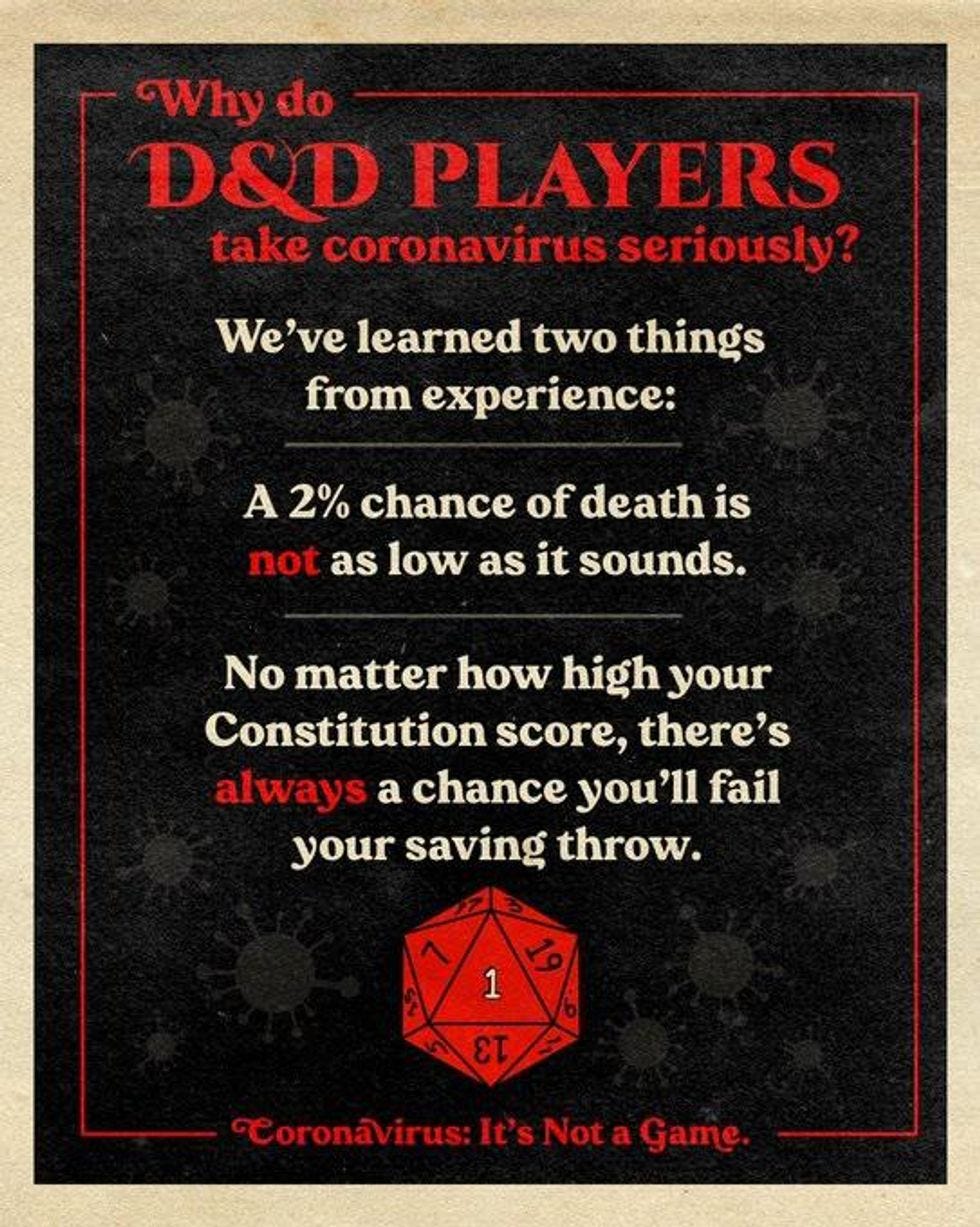CDC Document: COVID Variant Not The Delta Blues Anyone Wants
Hellhound on our trail.
The Delta variant of the coronavirus is far nastier than previous forms we've had to deal with because it's far more easily transmitted and causes much more severe illness, according to an internal Centers for Disease Control and Prevention document obtained by the Washington Post. The slide presentation discusses ways in which the CDC needs to reframe how Americans think about the disease, saying health officials should "acknowledge the war has changed."
The document strikes an urgent note, revealing the agency knows it must revamp its public messaging to emphasize vaccination as the best defense against a variant so contagious that it acts almost like a different novel virus, leaping from target to target more swiftly than Ebola or the common cold .
It cites a combination of recently obtained, still-unpublished data from outbreak investigations and outside studies showing that vaccinated individuals infected with delta may be able to transmit the virus as easily as those who are unvaccinated. Vaccinated people infected with delta have measurable viral loads similar to those who are unvaccinated and infected with the variant. [...]
CDC scientists were so alarmed by the new research that the agency earlier this week significantly changed guidance for vaccinated people even before making new data public.
An unnamed "federal health official" told the Post the CDC will be publishing the full data today.
This is some scary reading; WaPo considers the story important enough to public health that it's dropped the paywall for this one, as it did for much of its coronavirus coverage in the early days of the pandemic last year.
The Post story points out that the slideshow "includes a note that the findings and conclusions are those of the authors and do not necessarily represent the CDC's official position," so that seems like a disclaimer worth foregrounding.
We're just going to copy-paste some of this, to make sure we don't summarize it inaccurately for you:
One of the slides states that there is a higher risk among older age groups for hospitalization and death relative to younger people, regardless of vaccination status. Another estimates that there are 35,000 symptomatic infections per week among 162 million vaccinated Americans.
The slideshow offers a look into the "communication challenges" posed by breakthrough infections of people who are fully vaccinated: The CDC needs to remind people that the three currently available vaccines are highly effective in preventing severe illness and death from COVID-19, while also letting them know that vaccinated people can still transmit the virus to others if infected. (A reminder also, from us, that the vaccines stop 80 percent or more of infections from occurring at all.)
The anonymous official told the Post ,
Although it's rare, we believe that at an individual level, vaccinated people may spread the virus, which is why we updated our recommendation. [...] Waiting even days to publish the data could result in needless suffering and as public health professionals we cannot accept that.
The main focus of the document is on meeting the resulting rhetorical problem: The Delta variant is so much worse than previous versions of the virus that the agency needs to communicate the heightened risk without undermining general confidence in the vaccines, which really are very good, but which people may have come to think were absolute shields against sickness.
The Post spoke to real a live communications prof, Matthew Seeger of Wayne State University in Detroit, who said that after officials touted the effectiveness of the vaccines, saying they're over 90 percent effective and such, people hearing about breakthrough infections may think they were lied to, the cold equations of probability notwithstanding. We know that 90 percent isn't 100 percent, but we're also not likely to take sunscreen along when the forecast says there's a 90 percent chance of rain ( which is also confusing, frankly).
"We've done a great job of telling the public these are miracle vaccines," Seeger said. "We have probably fallen a little into the trap of over-reassurance, which is one of the challenges of any crisis communication circumstance.
All of this reminds me of a goofy Dungeons and Dragons meme about probability and risk, sorry not sorry.

So again, the answer is to keep encouraging people to get vaccinated, even as the public needs a better sense of the risks posed by the Delta variant.
The document makes clear that vaccination provides substantial protection against the virus. But it also states that the CDC must "improve communications around individual risk among [the] vaccinated" because that risk depends on a host of factors, including age and whether someone has a compromised immune system.
The document includes CDC data from studies showing that the vaccines are not as effective in immunocompromised patients and nursing home residents, raising the possibility that some at-risk individuals will need an additional vaccine dose.
As of yet, the CDC hasn't called for any additional doses, even among immunocompromised folks, although it is studying whether to do so.
The presentation also points out that, as more of the population gets vaccinated, breakthrough cases will also increase, because again, vaccinations provide protection but not 100 percent:
This echoes data seen from studies in other countries, including highly vaccinated Singapore, where 75 percent of new infections reportedly occur in people who are partially and fully vaccinated.
While the Post doesn't mention it, that really suggests to us it would be a good idea to drop the phrase "pandemic of the unvaccinated," because while it may be mostly accurate at the moment, that's not likely to remain the case.
It would also help enormously if the CDC could find a way to more effectively communicate to the public about risk and the fact that recommendations may have to change as new information develops, because that's how science do, particularly when dealing with a virus that hasliterally mutated.The challenge is to do that without sounding like it's just changing course willy-nilly, which has been a problem all through the pandemic.
The complexity of the situation, plus the fact that the science is still developing, and mixed in with general skepticism about government and authorities, all make communicating about medical information tricky at the best of times. Add in partisan hucksters, misinformation peddlers, and an entire "news" network dedicated to bad-faith argument, and ... damn, it's surprising any accurate information gets to the public at all.
[ WaPo / Photo: Visit Mississippi, Creative Commons License 2.0 ]
Yr Wonkette is funded entirely by reader donations! Money us if you can — we will never lie to you unless it's both very obvious and funny.
Do your Amazon shopping through this link, because reasons .




Yikes!
I just checked my school district's website. They're still planning on in-person full-day full-week learning though with everyone wearing masks. But the site says the situation is still developing and their plans could still change.